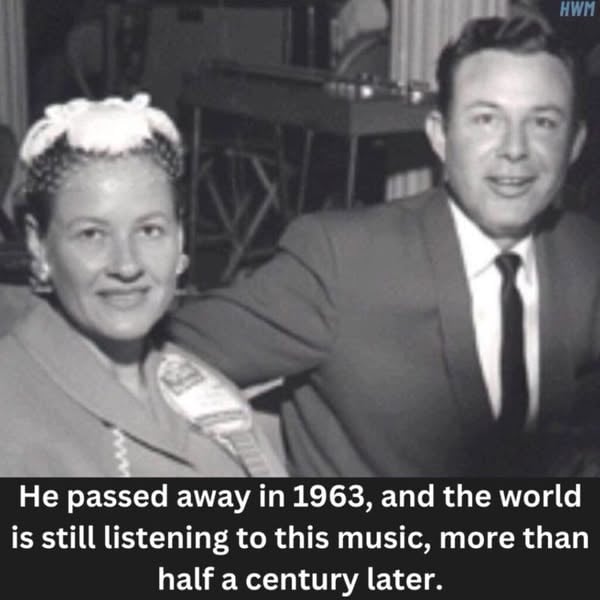In the year 1960, a quiet revolution in music took place that would carve a lasting mark on both country and pop genres forever. That revolution was sparked by the release of “He’ll Have to Go,” a song by the legendary Jim Reeves. Known for his smooth, velvety voice and sophisticated style, Reeves managed to bridge the gap between different musical worlds—softening the rough edges of country music and making it more accessible to mainstream audiences. What made this song a true game-changer wasn’t just its catchy melody or Reeves’s impeccable delivery; it was the way it captured raw emotion with such subtlety and grace, turning him into an overnight icon and a symbol of musical innovation.
The story behind “He’ll Have to Go” reveals the depth of Reeves’s artistry and the real-life inspiration that fueled this unforgettable track. Jim Reeves was often called “Gentleman Jim” for a reason—he had a unique ability to blend elegance with emotional sincerity. Born in Texas, Reeves started his career as a radio announcer, a job that honed his vocal control and gave him a deep understanding of how to connect with an audience without shouting or exaggeration. By the time “He’ll Have to Go” was released, Reeves was already a star in his own right—respected in country circles but still considered somewhat of an underdog in the mainstream music industry.
The story behind the song’s creation is almost as compelling as the song itself. Joe and Audrey Allison, the songwriters, crafted “He’ll Have to Go” based on a real-life moment that resonated with so many people—an overheard plea that expressed longing, vulnerability, and heartbreak. Joe Allison was in a bar when he overheard a man desperately pleading with his lover over the phone, softly asking her to come back or at least stay nearby: “Put your sweet lips a little closer to the phone.” That simple line struck a chord with him, encapsulating the loneliness and hope that can be felt even in the simplest gestures.
When Jim Reeves recorded his version, he didn’t just sing the words—he embodied them. His voice, warm and rich, conveyed an intimacy that listeners could feel deep in their bones. Producer Chet Atkins, legendary in his own right, had a clear vision: keep the backing minimalistic. The arrangement was sparse, just enough to support Reeves’s vocals without overpowering them. The result was a version of “He’ll Have to Go” that sounded almost like Reeves was singing directly into the listener’s ear. The emotional core of the song shone through, pulling listeners into a space of heartfelt longing and vulnerability.
Reeves’s “He’ll Have to Go” broke down barriers in music. It was a song that could be played in a honky-tonk or on a sophisticated radio station, a blend of heartfelt country storytelling and polished pop production. The velvet tone of his voice made even the simplest phrase sound profound. His style showed what it meant to truly connect with an audience—music that told a story, and singers who sang with their soul, not just their lungs.
What set Reeves apart was not just his impeccable voice but his ability to convey emotion without melodrama. His singing was understated, yet every note carried weight. This understated delivery made “He’ll Have to Go” a timeless classic—one that has been covered countless times and beloved by generations. To this day, many consider it one of the greatest country-pop songs ever recorded—an anthem of longing that transcends age, genre, and boundaries.
The immense popularity of “He’ll Have to Go” helped solidify Reeves’s place in music history. It launched him into a new league, transforming him from a respected country singer to an international star. His polished style brought a new dimension to country music—one that embraced sophistication while maintaining authenticity. That balance is part of what made Jim Reeves a trailblazer and a legend.
Beyond his artistry, Reeves’s personal journey reminds us of the power of sincerity. His rise and his performances teach an important lesson: that genuine emotion, when expressed with humility and grace, can create a connection that outlasts trends and fads. His voice, soaked in emotion yet controlled, showed that music’s most powerful tool is honesty. That’s why “He’ll Have to Go” remains so enduring—because it speaks to the universal experience of longing, heartache, and hope.
In today’s fast-changing music landscape, Reeves’s story remains relevant. It encourages artists and listeners alike to value authenticity over spectacle, substance over superficiality. “He’ll Have to Go” is more than a song; it’s a reminder that real connection—whether through music or in life—is rooted in emotion, vulnerability, and truth.
Ultimately, Jim Reeves’s “He’ll Have to Go” was a groundbreaking record that forever changed both country and pop music. Its influence is seen in countless artists who blend emotion with polish, striving to touch hearts the way Reeves did. His legacy lives on through the timeless power of his voice and the stories




